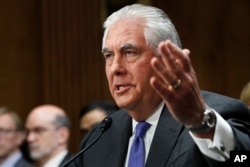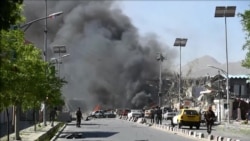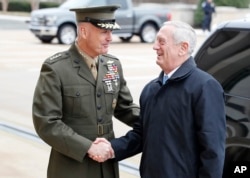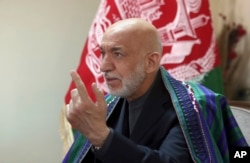While President Donald Trump's administration is seeking a reason to keep American troops in Afghanistan after 16 years of war, U.S. officials are also examining options to stabilize conflicts in the region, including a dialogue that would move forward a peace process.
Secretary of State Rex Tillerson is not advocating for military options, but looking to facilitate a dialogue between Kabul and the Taliban, according to the State Department.
"I think one of the things that the secretary feels very strongly about is trying to develop — get to a place where we can have some sort of a peace process. And that means actually sitting down and talking with members of the Taliban and starting to facilitate that kind of dialogue," State Department spokesperson Heather Nauert said earlier this week.
"Ultimately, like in many situations in many other countries, military options or our military strategy is not necessarily going to win those countries and put peace back together," Nauert told VOA. "It's part of it. But in the long run, you have to bring both sides to the table or multiple sides to the table together to determine their future."
Watch: Seeking a Way Forward in Afghanistan, Tillerson Pushes for Diplomacy
Policy under review
The Trump administration has yet to complete its policy review to stabilize Afghanistan. Officials say it will likely be weeks before a plan is finalized and announced.
When Trump was asked by a reporter on July 20 whether he would deploy additional American troops to the war-torn country, the president responded: "We'll see."
Trump's team is said to split over how to stabilize Afghanistan.
The military contingency — National Security Adviser H.R. McMaster, Secretary of Defense Jim Mattis, Chairman of the Joint Chiefs of Staff General Joseph Dunford — all seem to agree with their commander on the ground that a troop increase in Afghanistan should be one part of a complex solution.
"But the secretary of state is not going to advocate or is not going to work on Mr. McMaster's behalf or on General Mattis' behalf," Nauert said. "Our piece of it to work on is more from the diplomacy standpoint and humanitarian assistance."
Dangers of security over diplomacy
Some analysts warn of the danger of prioritizing security over diplomacy. They argue Washington should find a comprehensive strategy, which addresses many of the challenges Kabul is facing.
"I really think that the Trump administration could really suffer politically if it were to commit to an open-ended troop commitment in Afghanistan, which seems to be one of the directions that it is considering going," Michael Kugelman, deputy director for South Asia at the Wilson Center, told VOA.
"It has to be a strategy, it cannot be limited to a security solution," Kugelman said. "We really need to be thinking about the diplomatic strategy, and specifically, how to engage with the Afghan government, which is in a lot of trouble."
In a recent interview with VOA's Afghan Service in Kabul, former Afghan President Hamid Karzai said he strongly opposed a policy that sends a message to intensify the war.
Instead, Karzai said he supported a U.S. strategy that is meant to pursue peace, promote unity and foster good relations with Afghanistan's neighbors.
"A surge of troops will lead to the intensification of war in the country. I wholeheartedly and strongly oppose it. We want peace, peace and peace," Karzai told VOA.
Meanwhile, responding to a New York Times report that Afghanistan's mineral wealth may be a reason for Trump to remain engaged in the country, Nauert told VOA on Thursday that she had seen the report, but with the Afghanistan policy review still under way, she would not get ahead of the final decisions made by the president.
"They will come to conclusion about that," she said.









